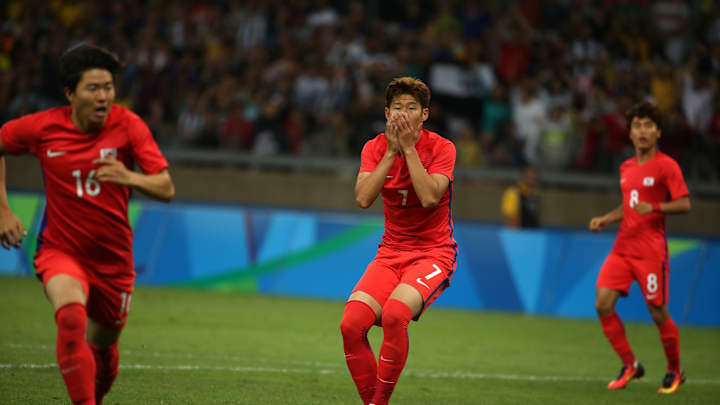S. Korean military pass for Olympic medalists called unfair

RIO DE JANEIRO (AP) South Korea's chance at an Olympic soccer medal gone, forward Son Heung-min dropped to his knees, put his forehead on the grass and wept.
Anguish over the end of a chance at Olympic glory? Without doubt.
But with the loss to Honduras, Son and his teammates had also missed out on what has been a powerful added incentive since the days when South Korea was a military dictatorship: Men who step onto the medal podium are exempted from the approximately two years of military service that nearly all young, able bodied South Korean men, from pop stars to lawmakers' sons, have to perform in the face of North Korean threats of war.
''I couldn't stop crying because I was so sorry for letting my teammates down,'' said Son, 24, who plays with the English Premier League club Tottenham and who acknowledged ahead of the game that a military exemption was on his mind. ''I couldn't even look at their faces.''
Since the early 1970s, South Korean officials have linked the exemptions to medals, an attempt originally by military strongmen to associate Olympic achievement with national pride and regime loyalty. But there are now growing calls to scrap what had once been regarded as a deserved perk for heroic athletic accomplishment.
There's widespread resentment over mandatory military service in general amid a terrible job market and the failure of South Korea's military to eliminate bullying and abuse in the barracks. And full-time athletes already get unfair special treatment, critics believe, even when they don't win medals. Athletes, for instance, many of whom are rich and famous, can spend their mandatory service playing for military- or police-run sports teams.
Regular South Koreans, meanwhile, often see their lives thrown into turmoil in their youths because they have to interrupt their educations or careers, a major disadvantage in South Korea's ultra-competitive society. The discontent about preferential treatment has been bubbling to the surface for some time.
For instance, even amid the excitement in South Korea over the country winning its first-ever Olympic soccer medal, at the London Games, there were bitter jokes about reserve defender Kim Ki-hee, who, after failing to log a single minute in previous matches, qualified for military exemption by playing the last five minutes of the bronze medal match against Japan.
''The taxes we pay are already spent on training these athletes, and it's strange that we additionally reward them with military exemptions when they actually do well,'' said Kim Min-seok, 38, an office worker in Seoul. ''We should overcome and change this nationalistic approach to sports and the system for developing elite athletes, not further promote it.''
Until the 1980s, South Korea compensated performers from a large number of competitions, including world championships and even the World University Games. Since then, the exemptions have been narrowed to winners of Olympic medals and Asian Game golds.
But there are still exceptions.
Laws were temporarily changed to grant exemptions to South Korea's national men's soccer team, which finished a surprising fourth in the 2002 World Cup, and to national baseball team players who finished third in the 2006 World Baseball Classic.
More than 80 male athletes are currently being exempted from military service, save for four weeks of military training, according to South Korea's Military Manpower Administration.
Seung Yun Lee, a professor at Seoul's Konkuk University, said South Korea should recognize changing public sentiments and declining Olympic popularity and shift its focus from grooming a small number of elite athletes to strengthening sports facilities and programs for regular people.
Ha Taekwon, a former South Korean Olympic badminton champion, defends military exemptions for young Olympic medalists who, unlike others, only have a small window of prime performance.
Because Olympic medal winners also receive lifelong government payments of up to 1 million won ($900) a month, military exemptions mean much more to athletes in less popular sports than they do to highly compensated soccer and baseball players, for instance, Ha said.
''It was the biggest thing going through my mind,'' Ha said of the possibility of a military exemption in the lead-up to his bronze medal win in badminton doubles at the 2000 Olympics in Sydney.
''After the pressure (of military service) was lifted, I found myself playing more loosely and aggressively,'' said Ha, who won a doubles gold at the 2004 Athens Games.
---
Kim reported from Seoul.
---
Follow Foster Klug at www.twitter.com/apklug . His work can be found at http://bigstory.ap.org/content/foster-klug .
